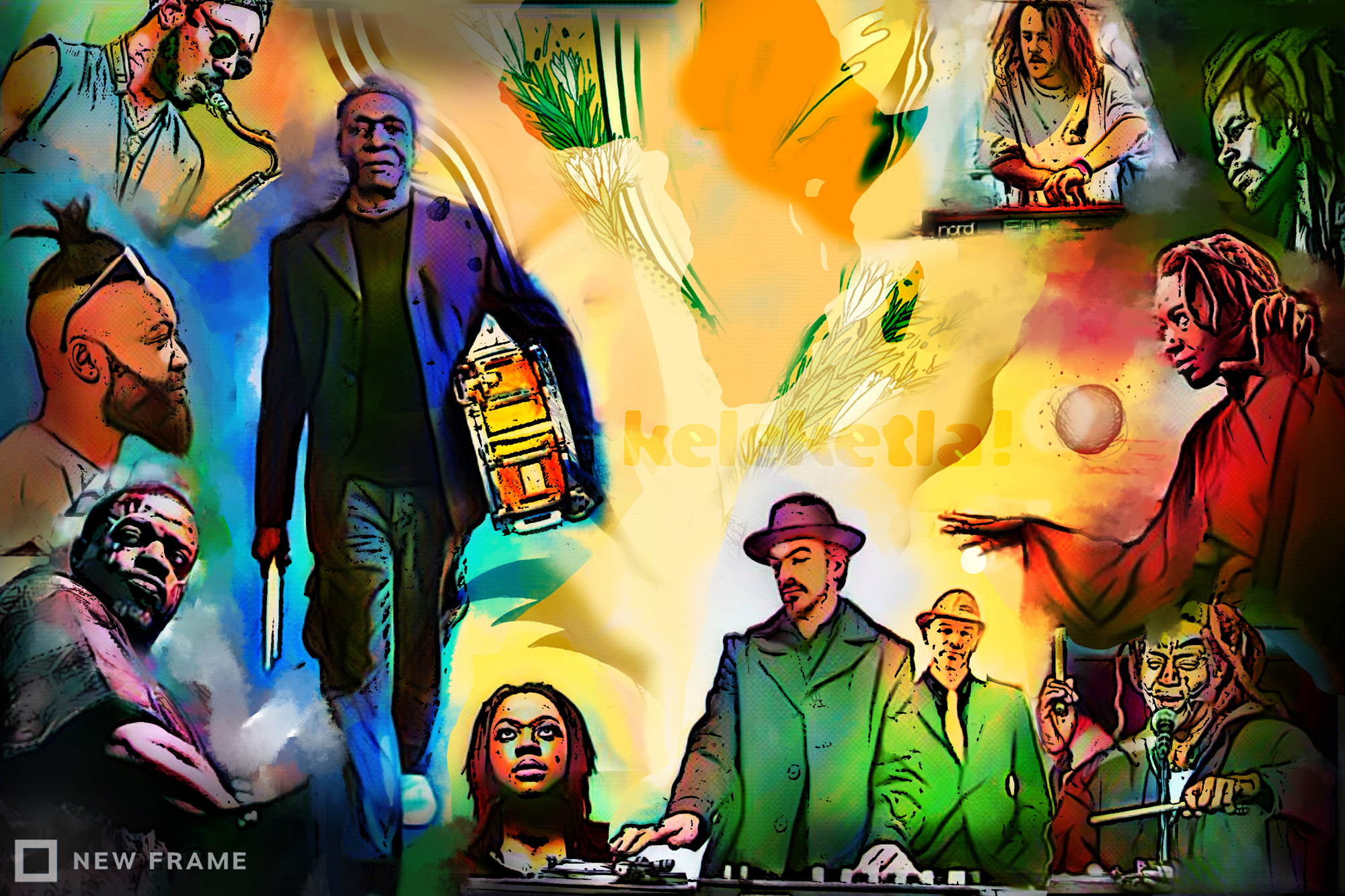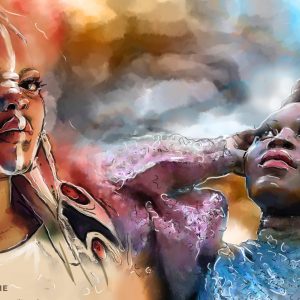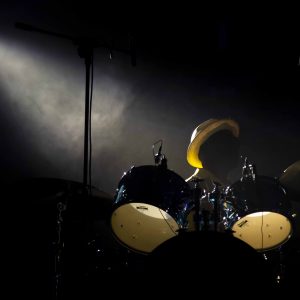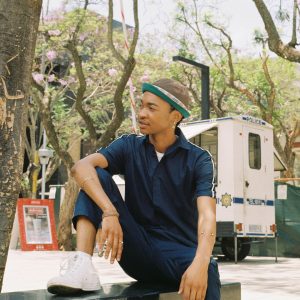The ‘beautiful experience’ of making and hearing Keleketla!
Three years in the making by Keleketla! Library and Coldcut, Keleketla! is a global fusion record that satisfies as a whole, delivering its punch with spectacular musical activism.
Author:
20 July 2020

Whether it’s the Afrobeat/gqom fusion of Future Toyi Toyi, the funky strut of Freedom Groove or the horn-propelled breakbeat construction of Crystallise, the Johannesburg-initiated global fusion record Keleketla! has myriad musical joys for listeners from across the world. The album brings together a global roster of musicians and cultural institutions to create one of 2020’s musical highlights.
To begin with there is Johannesburg’s Keleketla! Library, an independent library and media arts initiative. Then there’s electronic music duo Coldcut comprising Matt Black and Jonathan More, the founders of legendary British record label Ninja Tune. Add to these independent Joburg record label Mushroom Hour Half Hour and it’s a fine roster of preeminent South African musicians alongside a star-studded line-up of international guest artists including Tony Allen, Shabaka Hutchings, The Watts Prophets and Antibalas.
The album, which took three years to be realised and released, was well worth the wait.
‘Unfolding narrative’
For Keleketla! Library co-founder Rangoato Hlasane, the real joy to emerge from Keleketla! was hearing the “unfolding narrative” of the album’s journey over the past three years. Keleketla! had a particularly long gestation period, as albums go.
Coldcut visited South Africa in 2017 and work began with initial sessions at Track Side in Soweto, which provided the “skeleton” for the album, as Hlasane describes it. Returning to London, Coldcut held more sessions in 2018 and 2019 before completing the mixing of the album this year.
During this period, Hlasane and fellow Keleketla! founder Malose Malahlela were in constant contact with Coldcut via video calls as they consulted on the album’s progression. “We got to hear several expansions of the songs, hearing additions added slowly over time,” he says. “It was a blessing to hear these subtle changes.”
He describes hearing UK artist Shabaka Hutchings’ saxophone contributions. The way the horn punctuates Yugen Blakrok’s delightful cosmic rhyme on album standout Crystallise is pure magic and just one of the many moments that reaffirm the spirit of this global collaborative project.
Related article:
Hutchings, as Hlasane points out, has an ongoing relationship with Johannesburg, being a regular visitor and performer while also collaborating with many Joburg-based musicians in his band, The Ancestors. However, his parts for Keleketla! were not recorded in Soweto, like those of South African guitarist Sibusile Xaba and percussionist Thabang Tabane. They were recorded at sessions for the album in London, for which Hlasane and Malahlela were not present even though they initiated the project.
It was the Keleketla! Library founders who approached Coldcut. They felt the British duo’s independent musical narrative chimed with the work they were involved in. Hlasane says the addition of Hutchings to the album is even more significant because of his relationship with Johannesburg. “That made me think that this album is bigger than the music itself,” he says.
Soweto skeleton
Many of the South African musicians who recorded their contributions in 2017 only heard the finished album for the first time a month or two ago. Tabane heard the album for the first time a few days before speaking to New Frame. “The other day, my wife said to me you really need to listen to this album,” he says. “I was very surprised.”
For Tabane, the global collaboration means he is now featured drumming alongside Nigerian Afrobeat legend Tony Allen. Allen’s stickwork features on five of the album’s nine tracks. “That’s the coolest thing,” says Tabane.
Related article:
Xaba and Tabane were putting the finishing touches to Xaba’s widely heralded 2017 debut album Unlearning/Open Letter to Adoniah, when they heard about the upcoming sessions with Coldcut. “We were in the final stages of Sibusile’s album when Andrew Curnow from our record label, Mushroom Hour Half Hour, told us about the project,” said Tabane.
The two South Africans had never heard of Coldcut, but were convinced to take part in the sessions. Tabane says he quickly did some internet searches on Black and More and when he realised who his co-collaborators would be, he freaked out a little. “Those guys are legends,” he says. Besides their own groundbreaking output as Coldcut and that of their label Ninja Tune, the duo have produced and remixed music for artists like Eric B and Rakim, Queen Latifah and Steve Reich.
Xaba explains he had not heard Coldcut’s music before the session. “It was only when I was touring my debut album in the United Kingdom and I hooked up with More again, that he played me some of Coldcut’s music.” Tabane says he was concerned about the age difference between the Coldcut duo and the South African musicians, but after a day or two of jamming, everything flowed. “It wasn’t as intense as I had imagined, it was a very relaxed mood.”
The South African sessions for Keleketla! featured singers Nono Nkoane and Tubatsi Moloi, bassist Gally Ngoveni, gqom producer DJ Mabheko, Blakrok and hip-hop crew Soundz of the South Collective alongside Xaba and Tabane.
Tabane recalls recording another album standout, 5&1. “There was no kick drum when we were recording that,” he says. “So it was just me on the congas, and people have these notions that percussionists can’t lead.”
Related article:
“They were skeptical whether I could pull it off,” he says. “But at the end of the day, it was a bomb.”
5&1 is a bomb indeed, bringing a light touch to the album with Joe Armon-Jones’ piano, which was overdubbed in London, acting as a perfect accompaniment to the parts laid down in Soweto by Nkoane, Moloi, Ngoveni, Tabane and Xaba.
Xaba describes the sessions for the album at Track Side as “effortless” and “magical”. “Everything was spontaneous,” he says. “Cats wrote on the spot.” “We laughed so much,” recalls Xaba. “I remember a lot of laughing and you can feel that spirit in the album.”
Xaba was blown away when he heard the finished product. “It’s a very mature record, and it was a beautiful experience to be involved in,” he says.
Global sound
The album, which dropped on 3 July, was preceded by the singles Future Toyi Toyi and International Love Affair in May and June respectively, with a host of remixes. The best of these include Detroit native DJ Stingray’s remix of the former and Montreal’s Project Pablo “Club Mix” of the latter.
Future Toyi Toyi was recorded in Khayelitsha and features a recording Coldcut made of Soundz of the South. The single version features the skills of Durban’s DJ Mabheko.
However, Keleketla! is not the kind of album where you can just pay attention to the singles. It needs to be consumed as a whole: album, singles, remixes, the lot. It’s a project with a global sound that is significantly accentuated by a full immersion in all its elements.
Hearing DJ Stingray bring a Detroit techno slant to the Afrobeat/gqom fusion of Future Toyi Toyi is as critical as hearing the Coldcut and Allen improv jam that developed into a powerful call to freedom, featuring Father Amde Hamilton from The Watts Prophets and the powerhouse horns of US-based Afrobeat outfit Antibalas. This album track, titled Freedom Groove, emerged after the Soweto sessions were complete but is a seamless fit on the album.
Keleketla! is not the kind of global fusion project that delivers individually interesting songs. It is a global fusion record that satisfies as a whole, delivering its punch with spectacular musical activism.



